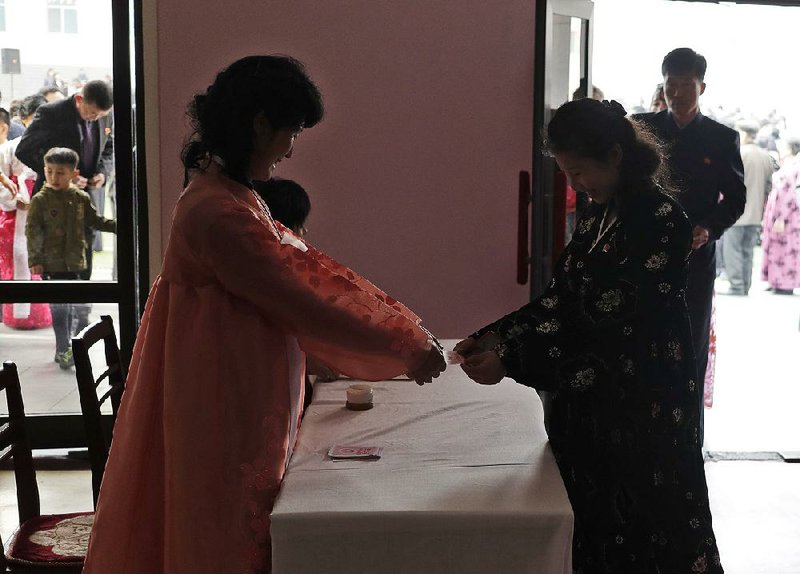PYONGYANG, North Korea -- Millions of North Korean voters, including leader Kim Jong Un, went to the polls on Sunday to elect a new lineup of roughly 700 members for the next session of the national legislature, though the vote was more of an endorsement than a competitive contest.
Voters were presented with just one state-sanctioned candidate per seat and cast their ballots not to select but rather to show their approval or, at least theoretically, disapproval of that candidate.
The elections, last held in 2014, are for the entire Supreme People's Assembly, which on paper is the highest organ of power in North Korea. Its delegates come from all over the country and all walks of life. The candidates are selected by the ruling Korean Workers' Party and a couple of other smaller coalition parties that have seats in the assembly.
Kim, fresh off his trip to Hanoi for his second summit with President Donald Trump, is a member of the assembly, though his power rests in his complete control over the ruling party, government and military. State media showed footage of him casting his vote at a polling center at Pyongyang's Kim Chaek University of Technology.
As was the custom in the Soviet Union and other communist countries, turnout is generally reported at 99 percent or higher. Voting is generally regarded as a duty and responsibility. Staying at home is not an option.
"I'm very proud to be voting for the first time," said university student Kim Ju Gyong, 19, who cast her vote Sunday morning at the Pyongyang Primary School No. 4 polling station. "I feel happy to be a citizen and I want to do my best for the future of my country."
Under North Korean law, citizens can vote from the age of 17.
Voting began about 10 a.m. local time, depending on the location, and continued until late evening. Voters show election officials their ID cards to receive their ballot with the sole candidate's name on it, which they cast in a private booth. If they approve, they simply put the ballot in the box. If they don't approve, they cross the name out and put it in the same box.
But one official told The Associated Press that basically never happens.
"No one votes against the candidate," said Jin Ki Chol, the chairman of an election committee supervising a polling station at a cable factory in central Pyongyang.
Election days have a festive mood. Bands play music as voters wait in line, and there is group dancing for those who have already finished.
"The election will strikingly manifest the fixed will of our people to firmly trust and uphold to the last Supreme Leader Kim Jong Un despite storm and stress," the ruling party's official daily said in a commentary Sunday.
SUSPECT FREED
As North Korea tallied the votes early today, a suspect in the killing of Kim's half brother was freed from custody in Malaysia.
Prosecutors gave no reason for asking to withdraw the charge that Siti Aisyah of Indonesia helped to kill Kim Jong Nam.
The judge discharged Aisyah without an acquittal, and Aisyah was quickly ushered out of the courtroom and into a waiting car. An emotional Aisyah told reporters she had only learned this morning that she would be freed: "I am surprised and very happy."
The murder trial of another suspect, Doan Thi Huong of Vietnam, was put on hold after the surprise development. She was to have begun giving her defense in today's court session.
The two women were accused of smearing VX nerve agent on Kim Jong Nam's face in an airport terminal in Kuala Lumpur on Feb. 13, 2017. They have said they thought they were taking part in a prank for a TV show. They were the only suspects in custody after four North Korean suspects fled the country the same morning Kim was killed.
Lawyers for the women have previously said they were pawns in a political assassination with clear links to North Korea, and that the prosecution failed to show the women had any intention to kill -- a crucial part of a murder charge under Malaysian law.
Malaysian officials have never officially accused North Korea, and they have made it clear they don't want the trial politicized.
Kim Jong Nam was the eldest son in the current generation of North Korea's ruling family. He had been living abroad for years but was seen as a potential threat to Kim Jong Un's rule.
Information for this article was contributed by Eileen Ng of The Associated Press.
A Section on 03/11/2019
